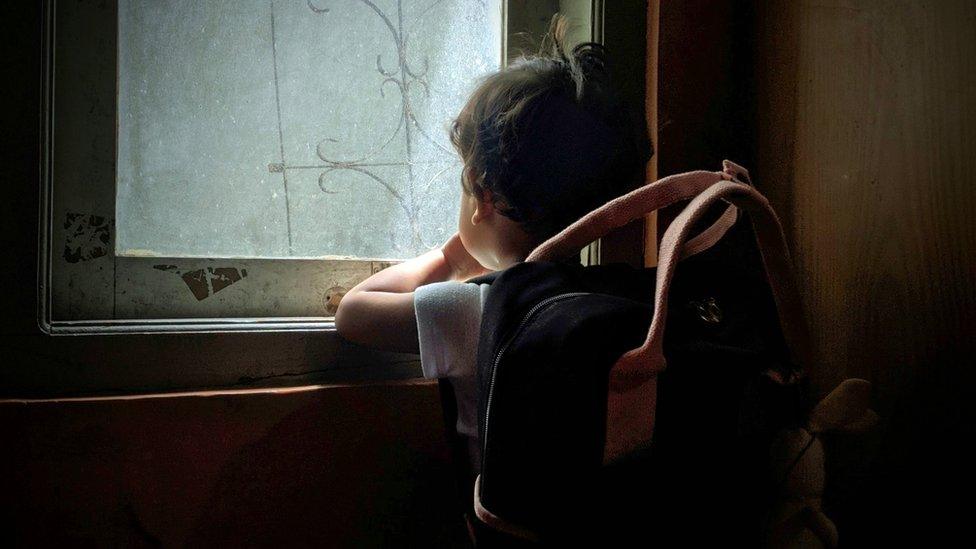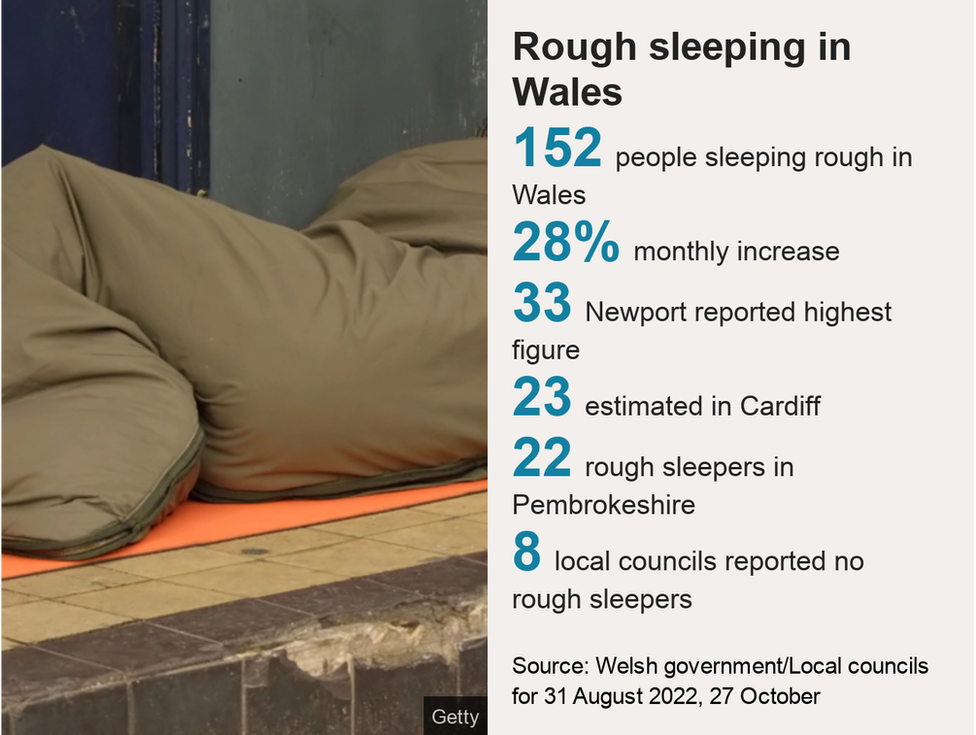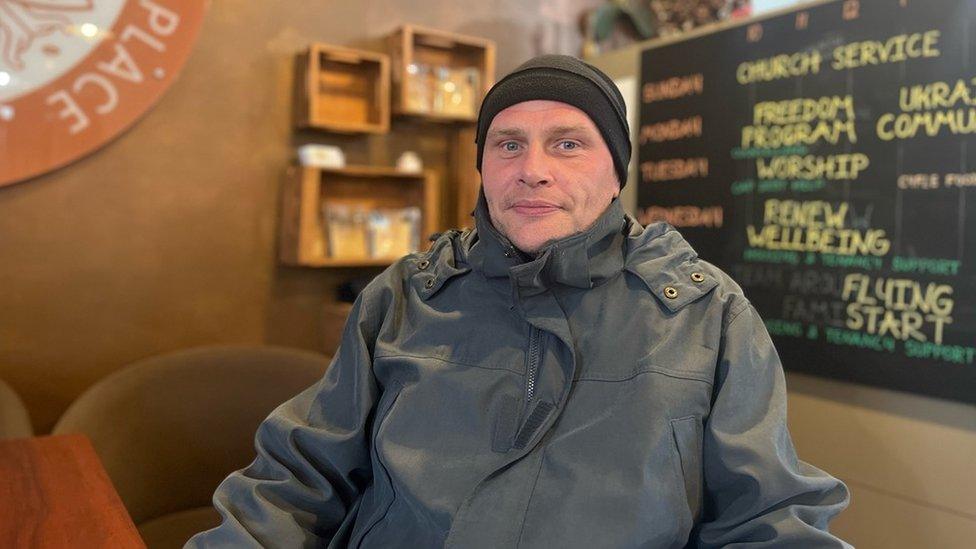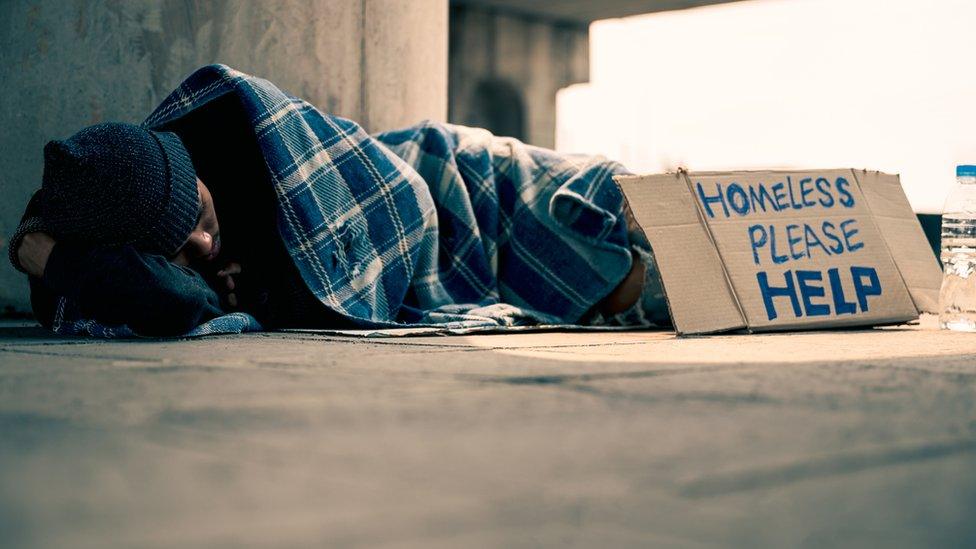Wales housing: Mother and baby in hotel due to shortage
- Published

More children are being placed in temporary accommodation due to a lack of homes
A mother and her newborn baby are among thousands of homeless people placed in temporary accommodation in Wales due to a lack of social housing.
Local authorities are having to put families in hotels that have no facilities to cook or wash clothes.
Ceri, from Gwynedd, spent four months in a hotel with her baby after registering homeless, as the local council had run out of social housing.
The Welsh government said it was committed to ending homelessness.
Research by BBC Wales shows the number of people living in temporary accommodation has risen by more than 5,000 in two years.
In August 2020 there were 3,577 people in Wales living in temporary accommodation, but that figure jumped to 8,545 in August 2022, with 2,515 of them children.
Charity Shelter Cymru said families were "living in limbo", while a councillor said the situation was "beyond a crisis".

Temporary accommodation is given by local authorities as a last resort to people who have no other housing options.
Ceri, who has asked for her surname not to be used to shield her identity, was housed in a hotel without any cooking facilities or a place to wash her clothes for four months as she waited for a home.
She has now been moved into a holding house as she waits for a permanent home to become available, but said she was left isolated in a rural location 20 miles (32km) away from her support network.
She has been waiting for 10 months, and said: "I just want a home in an area that I've chosen, where I can hop 10 minutes on a bus to see friends and family - somewhere I can call home."
Ceri registered as homeless in January, soon after having her first child, and with nowhere else to go she was housed in a hotel but said she did not expect to be living there for so long.
'Really hard'
"We were in the process of weaning, there was no way to cook - there was just a kettle in the room," she explained.
"We had to go out, eat out for those three meals a day and that costed. Travelling to friends and family to cook tea for the baby, and then the issue of getting him settled - it was just really hard."
Ceri said there were also booking issues and on more than one occasion she had to be moved to another hotel 25 miles (40km) away as the hotel where she was staying was full.
She has now been moved to a "holding house" in a rural part of Gwynedd, and while she said she was grateful she could now cook at home, she finds the lack of stability difficult.
"I really want to go back to work but I can't commit to getting a job around here as I could get a call tomorrow saying a house has been found in the area I've asked for which is miles away from here," she said.
Ceri did not blame the local authority and said she was sympathetic to its struggles.
Her situation is becoming more common across Wales.
'Living in a tent'

Wayne was initially living in a tent
Wayne, 40, is currently living in a Travelodge in Pembroke Dock due to a shortage of temporary accommodation.
He arrived in Pembrokeshire from Cumbria in March after his relationship broke down during Covid, and said he spent three months sleeping rough.
Wayne initially slept in a tent because Pembrokeshire council does not currently have a night shelter and there is a waiting list for emergency accommodation in the county.
"It's hard, because you don't know where to turn, you don't know where to go. You don't know what to expect. You don't know who's going to make what decision, it's just a waiting game," he said.

Local authorities are responsible for housing people who present as homeless
A Pembrokeshire council spokesman said it had seen "a significant increase" in the numbers of households on the social housing waiting list in the past two years.
It is currently putting up 161 households in temporary accommodation, including B&Bs and hostels.
The spokesman added: "However, due to the reduction of properties in the private rental market, it is becoming increasingly more difficult to find affordable and suitable accommodation in this sector.
"The council has increased its temporary accommodation provision, but unfortunately due to both limited availability and cost it has been difficult to continue to meet the escalating demand for this accommodation."
In Gwynedd, 247 people are living in temporary accommodation
The council's cabinet member for housing, Craig ab Iago, said he expected the situation to get worse due to a rise in the cost of living, a shortage of housing and the unstable future of Ukrainian refugees.
'Immoral'
"This isn't right, it's immoral. We are the sixth richest country in the world," he said.
"We're talking about millions of pounds more in housing people just in B&Bs... it's immoral... this is people's lives."
Local authorities are responsible for housing people who present as homeless, but Mr ab Iago admits it puts massive financial strain on the council's budget.
He called on the Welsh government to ramp up home-building efforts.
He described Ceri's situation as "heart-breaking", adding: "We need to see a substantial investment.
"The word crisis is used often, so often actually I don't think it justifies the scale of the problem.
"It's beyond a crisis… and local authorities are pulling their hair our not knowing what to do - we need to find a solution or these numbers will just continue to rise."
Shelter Cymru has also put emphasis on the rise in children in temporary accommodation, saying it has a massive impact on education and mental health.
'Committed to ending homelessness'
The Welsh government said: "We are committed to ending homelessness and ensuring that any incidences are rare, brief and unrepeated.
"We do this by ensuring people are quickly supported into a suitable and stable home and, this year, we have provided local authorities with an additional £10m to support with the costs associated with providing temporary accommodation.
"This is part of the £197m we are investing in homelessness and housing support services."